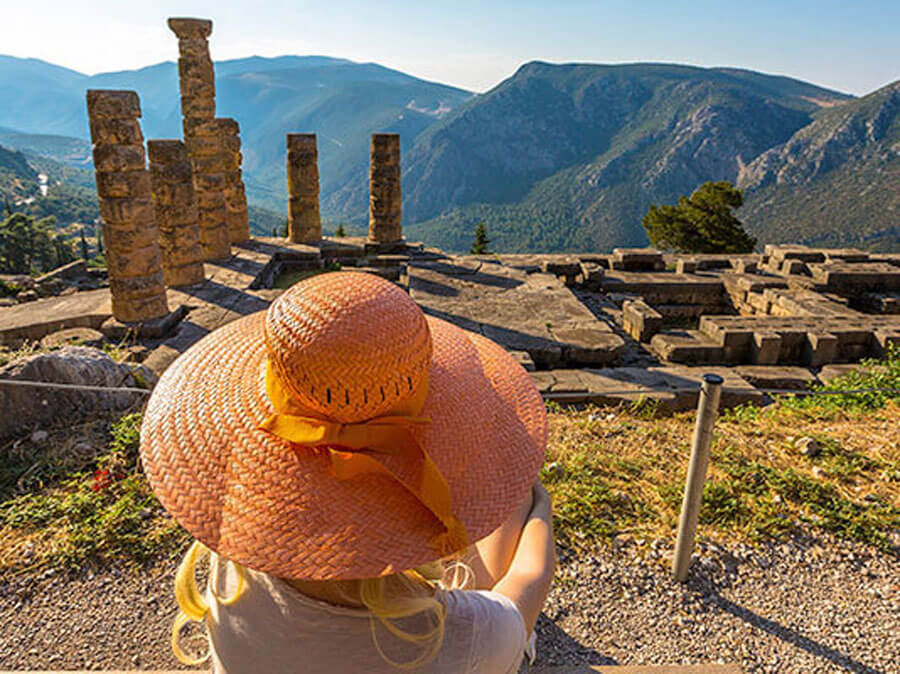1. Zeus
Zeus was the God of the sky and lightning. He was the supreme deity of the Ancient Greek Pantheon and King of Olympus. He was actually the youngest of his siblings. His father was the Titan Cronus who had swallowed all of his previous children in fear of being overthrown.
Zeus escaped this terrible fate with the help of his mother, the Titan Rhea, who tricked Cronus. He grew up on the island of Crete and managed to free his siblings from Cronus' stomach when he grew up. In the great battle that followed, known as the Titanomachy, the Olympian Gods defeated the Titans and became rulers of the world. The Olympic Games in Ancient Greece were held in honor of Zeus.
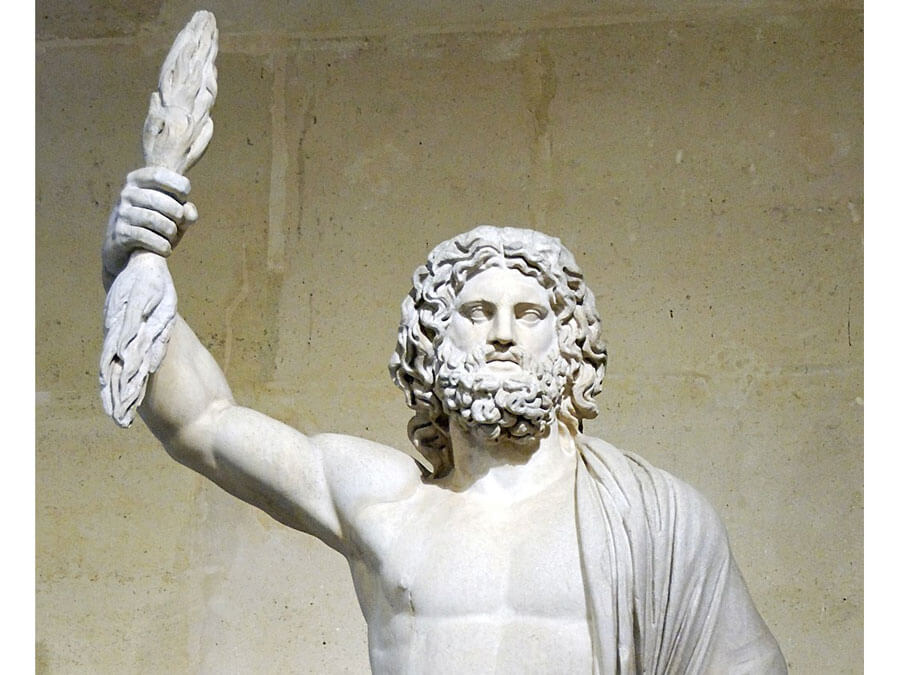
2. Poseidon
Poseidon was also the son of Titans Cronus and Rhea, and brother of Zeus. In Greek mythology, Poseidon was the God of the sea, earthquakes and horses. Poseidon’s weapon was a trident and by striking it, he would cause natural disasters, storms, earthquakes, volcanic eruptions, etc. Ancient Greeks had a calendar period dedicated exclusively to Poseidon which they named after him: Poseideon (between the months of November and December). During that month, the Ancients would hold a festival in his honor, called Poseidea.

3. Hades
Hades in Greek mythology was the King of the Underworld, the place down below where the souls would end up after dying. He was the brother of Zeus and Poseidon. Hades was a frightening form for the living. For many, just mentioning his name was scary. When the Greeks were praying to him, they clapped their hands on the ground to make sure he heard them. Black animals, such as sheep, were sacrificed in his honor. Every hundred years, festivities were held in his honor.

4. Hera
In Greek mythology, Hera was a sister and wife of Zeus, daughter of Titans Cronus and Rhea. She was the goddess of marriage and the protector of women. Hera was often described or portrayed holding a scepter as a symbol of sovereignty or pomegranate as a symbol of fertility. She was jealous of her husband and well-known for her vindictiveness! In honor of Hera, festivals were held in many cities of ancient Greece and were called Heraia. The most famous Heraia was held in Argos, Samos and Olympia.
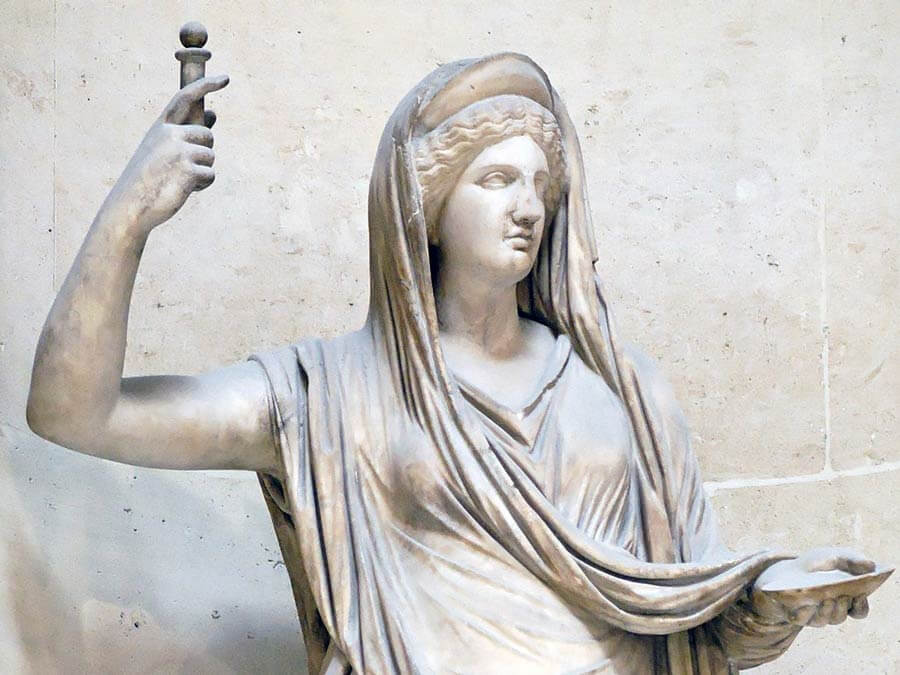
5. Demeter
Demeter was one of the greatest and oldest goddesses of ancient Greek mythology. Goddess of vegetation and agriculture, she particularly protected the cereal crops and the farmers. Demeter and her daughter, Persephone, were central characters in the Eleusinian Mysteries and were probably deities worshiped before the shaping of the Olympians’ Pantheon.
The capture of Persephone by god Hades resulted in the demise of Demeter. She abandoned Mount Olympus and began wandering the Earth, wearing black and in silence among mortals, in search of her dear Persephone. Nature and crops withered with her. When her daughter returned to her everything blossomed once again! Every year, Ancient Athenians were celebrating this renaissance with the mystical Eleusinian festivals!
6. Hestia
According to Greek mythology, Hestia was the goddess of family, home and hearth, the eternal flame that would keep the family’s home warm. The Ancients’ houses had a sanctuary in the center of them and the woman of the house had as a responsibility to keep Hestia’s flame burning. Goddess Hestia was the eldest daughter and the first child of Cronus and Rhea. She was always staying on mount Olympus, taking care of the sacred flame.

7. Hephaestus
Hephaestus was a clever and inventive Olympian God, master of construction and metallurgy, a skillful and capable craftsman. Hephaestus was such an ugly baby, that as soon as Hera, his mother, saw him, she threw him out of Olympus without a second thought and he ended up in the depths of the ocean! Hephaestus was a workaholic and almost all myths related to him were related to his work. The characteristic symbol of Hephaestus is, of course, his hammer!
![Skulptur: Herman Wilhelm Bissen; Photo: James Steakley <a target='_blank' href='https://creativecommons.org/licenses/by-sa/3.0--}[CC BY-SA]</a> Olympian God Hephaestus](/images/Blog/Olympian%20Gods/Olympian_God_Hephaestus.jpg)
8. Ares
Olympian God Ares was the son of Zeus and Hera. He was the God of war, provocative and impulsive in nature. He represented the more violent aspects of war, in contrast to the other Goddess of war, Athena. According to Greek mythology, he had a huge body, he was powerful and impetuous. He always rushed to battle with scary eyes. He screamed as loud as nine or ten thousand people fighting. He was always thirsty for blood, while he ignored the rules and recognized no law.
![Credit: After Alcamenes <a target='_blank' href='https://creativecommons.org/licenses/by/2.5'>[CC BY]</a> Olympian God Ares](/images/Blog/Olympian%20Gods/Olympian_God_Ares.jpg)
9. Athena
Goddess Athena was the goddess of wisdom and strategic warfare. The Temple of the Parthenon in Athens is the most famous temple dedicated to her. Athena was Zeus' favorite daughter. The story of her birth is very interesting and unique, storming out of Zeus’ forehead in full armor. She is symbolized by an owl and holds a spear and a shield made of goat's skin. There were many festivals in honor of the Goddess but the Great Panathenaea in Athens was probably the largest celebration in honor of her. She battled with Poseidon over the patronage of the city of Athens and won. This is also the mythological explanation of the naming of the city of Athens, the Greek capital. Protector of heroes and wisest among the Gods, Athena was considered one of the most powerful and important Olympian Gods.
10. Aphrodite
Goddess Aphrodite emerged from the sea and was the synonym of feminine beauty in antiquity. She was the goddess of love and desire. Gods and mortals were all entangled in her erotic nets. According to Greek mythology, she was born at the coast of Cyprus, from the foam of the sea after Cronus cut off the genitals of Uranus (her father) and threw them into the sea. Driven by Zephyrus, the Greek god of the west wind, into the sea, she was then transferred to Olympus, where she was introduced to Zeus and the other gods. Aphrodite had many lovers but her greatest love was the God of War, Ares.
![Credit: Tilemahos Efthimiadis <a target='_blank' href='https://creativecommons.org/licenses/by/2.0'>[CC BY]</a> Olympian Goddess Aphrodite](/images/Blog/Olympian%20Gods/Olympian_Goddess_Aphrodite.jpg)
11. Hermes
Olympian God Hermes was the god of trade, wealth, thieves and travelers. He was known as the Messenger God, as he was the one delivering messages between the Gods and the mortals with his golden flying sandals. The Olympian God was also known as the soul barer, the one that would lead the soul of the dead to the Gates of the Underworld. He is considered to be the first teacher of the human race, introducing the letters and sciences to mankind and teaching them the use of the intellect.
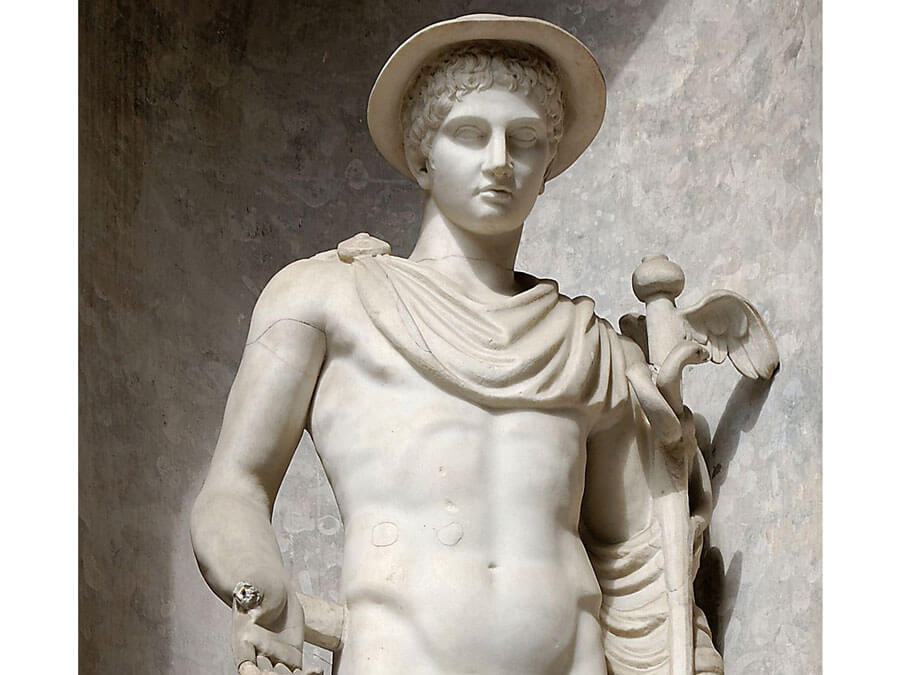
12. Apollo
Apollo was the god of light, music and harmony. Born on the sacred island of Delos, he climbed Olympus from the very first day and joined the other Olympians. He was the son of Zeus and Leto, and twin brother of Artemis. Apollo was one of the most important Olympian Gods and teacher of the nine Muses. His sanctuary at Delphi became the center of the Ancient World. The Oracle of Delphi was conveying Apollo's words and the oracles would influence the political scene of the then known world. The Pythian Games in Delphi were held in honor of Apollo and were one of the four Panhellenic Games of Ancient Greece, like the Olympic Games.
13. Artemis
Apollo's twin sister, Artemis, was the goddess of wildlife and hunting. She was also a helper of midwives as a goddess of birth. Among the elements of her character are her relationship with nature and hunting, war, dance and singing, and her virginity in combination with her fertility power. The Temple of Artemis in Ephesus, or Artemission as it is also known, was one of the Seven Wonders of the Ancient World. The festival of Artemis at Brauron was taking place every four years in honor of the Olympian Goddess, near Athens.

14. Hecate
Hecate was one of the main deities worshipped in the households of Athens. She is considered one of the greatest goddesses in ancient Greek religion and mythology. She was the goddess of witchcraft, the moon, the night and necromancy. Her sacred animals, among others, were the dog, the horse and the snake. The Goddess was able to look in three different directions (three-headed goddess) at the same time and she was considered as a protector of crossroads.

15. Persephone
Persephone was the daughter of goddess Demeter, the goddess of agriculture and fertility. Hades fell in love with Persephone and kidnapped her to the Underworld. Saddened by her loss, goddess Demeter searched for her daughter day and night without luck. Her sorrow caused the flora of the Earth to wither. Zeus, fearing the decrease in mortals’ sacrifices to the Gods, ordered his brother to free Persephone. Hades offered Persephone to eat six seeds of Pomegranate before she returns to the world of the living, binding her to the Underworld for six months every year. The myth of Persephone essentially explains the changing of seasons and the circle of life and is the origin of the Eleusinian Mysteries, the most sacred religious rites in Ancient Greece.
16. Tyche
Tyche was the goddess of fortune and a deity of ancient Greek mythology. She is a personification of prosperity and wealth. Tyche was depicted as a woman holding the cornucopia as a sign of wealth. Symbol of prosperity, growth, good fortune and abundance, the goddess could also condemn your fortune if you were not appreciative.
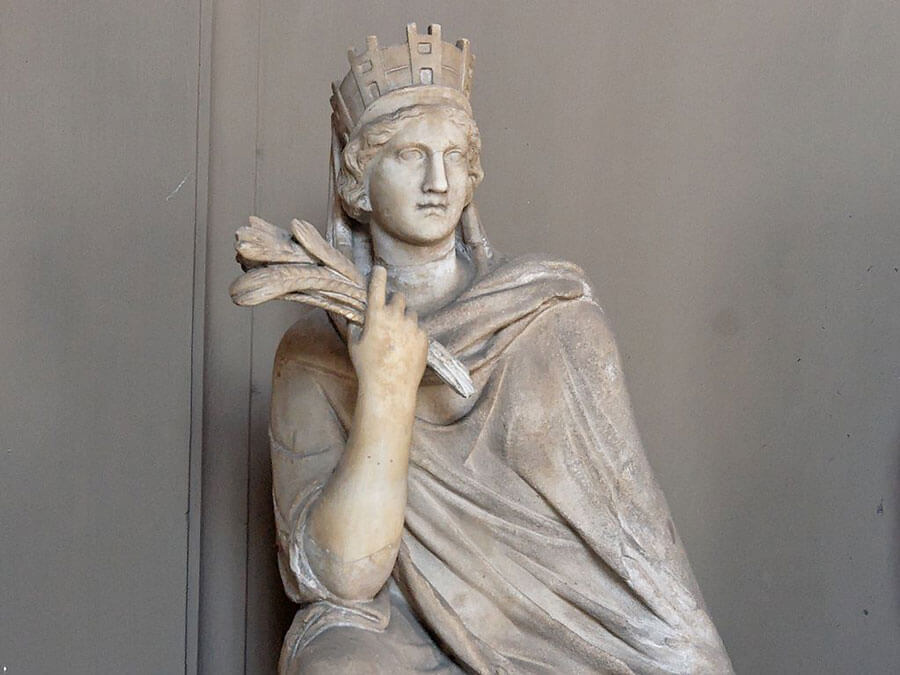
17. Eris
Eris was the daughter of Night and the goddess of jealousy. She was always causing divisions, squabbles and quarrels. According to Greek mythology, she was also a sister of God Ares. Eris usually shows up gossiping or humming, but sometimes she beautifies her appearance to achieve success in her scheming. She is the one that tossed the Apple of Discord in the midst of the feasts of the gods.
![Credit: Manfred Werner <a target='_blank' href='https://creativecommons.org/licenses/by-sa/4.0'>[CC BY-SA]</a> Olympian Goddess Iris](/images/Blog/Olympian%20Gods/Olympian_Goddess_Iris.jpg)
18. Aeolus
Aeolus, in Greek mythology, was the god of winds and lived on the enchanting island of Aeolia, where he kept all the winds inside his huge shepherd's bag, leaving them free only under the instructions of the major Olympic Gods. He was the one appointed by Zeus as the "treasurer of the winds".
19. Themis
Themis, in Greek mythology, was the goddess of divine order, natural law and fairness. Her law was sacred and applied equally to the gods, superior even to their will. She was usually depicted holding a sword, believed to represent her ability to cut fact from fiction.
![Credit: Tilemahos Efthimiadis <a target='_blank' href='https://creativecommons.org/licenses/by/2.0'>[CC BY]</a> Goddess Themis](/images/Blog/Olympian%20Gods/Goddess_Themis.jpg)
20. Pan
God Pan is an ancient Greek, idealistic, anthropomorphic and secondary deity that his father Hermes took with him in Olympus and everybody absolutely adored him. He was the god of Nature but also a personification of the genetic power of life. Pan was depicted having the lower legs of a goat and horns in his head. He was the protector of breeders, hunters, fishermen and shepherds, with permanent residence in nature. The erotic adventures he had with the various Nymphs are many and they defined almost every myth written about him.
![Credit: Tilemahos Efthimiadis <a target='_blank' href='https://creativecommons.org/licenses/by-sa/2.0'>[CC BY-SA]</a> Statue of Pan trying to seduce Aphrodite with Eros in between them](/images/Blog/Olympian%20Gods/God_Pan.jpg)
21. Eileithyia
Eileithyia was the goddess of birth and labor pains. She helped women give birth and withstand the pains of childbirth and caring for newborns. Before and after childbirth, the midwives offered her various special offers. However, since many women died during childbirth, she was also considered to be the goddess that causes death to women at childbirth.
22. Dionysus
The Olympian Dionysus was the god of wine and viticulture. The cult of Dionysus was the most popular in ancient Greece. He was a god of contrasts and of supreme exaltation and horror. Son of Zeus and Semeli, when he grew up, his father taught him how to grow grapes and make wine. Dionysus did not want to hold on to this charisma for himself and began to go from city to city and teach it to mortals. He had many followers, hybrid creatures that accompanied him everywhere, like satyrs and maenads. Many celebrations were dedicated to Dionysus, with the Dionysia festival being one of the largest celebrations in Ancient Greece.

23. Eros
In Greek mythology, Eros was the winged god of love. According to the legend, if he hit two people with his arrows they would fell in love. The god Eros was one of the most important gods of antiquity and, according to Hesiod’s Theogony, one of the three deities that created the world: “First there was Chaos, then Eros, then Earth”. Eros does not bless someone with birth but encourages and facilitates birth and creation. In Greek mythology, there are many versions and myths about god Eros, but according to the most dominant myth, Eros was the son of Aphrodite and god of war, Ares.

24. Asclepius
Asclepius was the god of medicine that was worshiped all over Greece in antiquity. Although Asclepius is not considered a major god in Greek mythology, it is still a central figure in the archetype of god-heroes-healers. Asclepius is the ideal conception of the healing power of nature, as it is perceived by humans today. One of the greatest festivals in his honor was the Prominent Askleipia, which was originally held every 4 years in Epidaurus and lasted 7 days.
![Credit: George E. Koronaios <a target='_blank' href='https://creativecommons.org/licenses/by-sa/4.0'>[CC BY-SA]</a> God Asclepius](/images/Blog/Olympian%20Gods/God_Asclepius.jpg)
25. Nyx
In Greek mythology, Goddess Nyx is the personification of the night. Nyx was a sovereign, primordial and cosmogenic entity that even god Zeus himself respected and feared. According to Hesiod's Theogony, Nix was born out of Chaos.
26. Nemesis
Nemesis was the goddess of divine retribution. Symbols of the goddess are the forearm and the bridle. These symbols are very indicative of its function to measure human thoughts, emotions, actions and to set a limit on the ruthless actions of people's selfishness. Thus, the mortal's attitude towards the Cosmic Laws and the indifference to the Common Good are swept away by the action of Nemesis that gives eternal justice.
![Credit: Zde <a target='_blank' href='https://creativecommons.org/licenses/by-sa/3.0'>[CC BY-SA]</a> Goddess Nemesis](/images/Blog/Olympian%20Gods/Goddess_Nemesis.jpg)
27. Phobos
Ιn Greek mythology, Phobos was the personification of fear. The Ancient Greeks considered him the son of the god of war, Ares, and the goddess of love, Aphrodite. He is represented with a lion's head and similar-looking to god Pan. For the Spartans, the sanctuary of Phobos was a symbol of discipline and cohesion of their military forces.
28. Hebe
Hebe, in Greek mythology, was presented as a goddess of youth and vivacity. She was the daughter of Zeus and Hera. Hebe had undertaken the task to supply the gods with nectar and ambrosia, the food that always kept them young. Hebe married Hercules when the demi-god hero ascended to Olympus. She was the gift Zeus and Hera offered to Hercules, for succeeding in his labors.
You may also like: Hercules: The Life and Labors of the Greek Hero
29. Deimos
In Greek mythology, Deimos was the personification of terror. He was the brother of Phobos. Together with his brother, who was the personification of fear, he accompanied his father to war. For this reason, he was offered sacrifices before a battle. His figure, along with his brother, adorned the famous shields of Agamemnon and Achilles.
30. Enyo
In Greek mythology Enyo (meaning ‘terror’) was a minor god of war, appearing in the environment of the major god of war Ares, and she is often regarded as his daughter. Sometimes, however, he is referred to as his sister or even his mother. In antiquity, Enyo was depicted bloodthirsty and being in scenes of violent acts. Enyo is first mentioned by Homer along with Athena and Ares, and the epic poet characterizes her as a deity worthy of respect for she was the one to loot or dominate cities and villages.
![Credit: Michel Wal <a target='_blank' href='https://creativecommons.org/licenses/by-sa/3.0'>[CC BY-SA]</a> Goddess Enyo](/images/Blog/Olympian%20Gods/Goddess_Enyo.jpg)
The Olympian Gods have indeed excited our imagination since we were children. However, the Olympians were not the only group of Greek Gods. There were countless major Gods and other minor deities, Titans, spirits and demi-gods. Have a look at the full list of Greek Gods.
More like this:
About the author: Our team at Greek TravelTellers consists of academics and lovers of Greek culture. Our vision is to convey our knowledge and Greek values through unique tours and experiences. Through our blog, we hope to bring Greek history and culture closer to you. Feel free to learn more about us.




